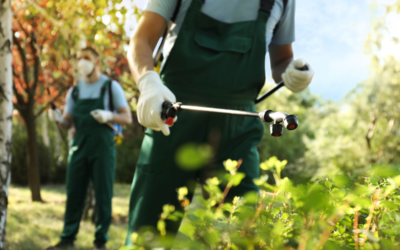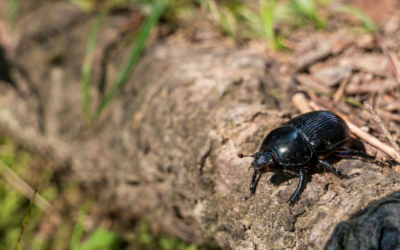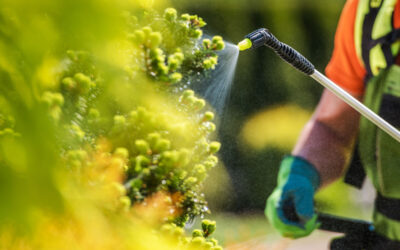Don’t Be Bugged Out: Winter Pests in Colorado’s Trees and Shrubs
While Colorado’s winters might bring snow-capped mountains and cozy evenings by the fire, they also pose a hidden threat to your beloved trees and shrubs: pests. Winter pests in Colorado’s trees and shrubs can wreak havoc on your precious greenery, leaving behind a trail of damage and disappointment.
Don’t let the dormant branches fool you; these tiny critters are still very much active and hungry, seeking shelter and sustenance within the intricate network of your winter landscape. So, before you bust out the hot cocoa, let’s dive into the world of wintertime pests in Denver and how to keep your greenery thriving:
Sap-Suckers:
- Scale insects: These armored insects camouflage themselves on bark and branches, sucking sap and leaving behind bumps and honeydew (a sticky substance).
- Aphids: These soft-bodied insects gather in colonies on leaves and stems, draining sap and causing distortion and discoloration.
Leaf Eaters:
- Bagworms: These camouflaged caterpillars live in silk bags, devouring leaves and leaving behind bare branches, especially on conifers.
- Tent caterpillars: These hairy caterpillars build conspicuous webs in the crooks of branches and feed on leaves, sometimes causing defoliation.
Needle Munchers:
- Budworms: These tiny caterpillars bore into buds and shoots, damaging new growth and stunting tree development.
- Ips beetles: These bark beetles attack stressed or injured trees, burrowing under the bark and laying eggs that hatch into more beetles, potentially killing the tree. For more information, view our page about IPS Engraver Beetles.
Other Pests:
- Hemlock woolly adelgid: This invasive insect specifically targets hemlocks, sucking sap and causing needle drop and branch dieback, posing a major threat to these iconic trees.
- Spider mites: These tiny arachnids thrive in dry conditions, sucking sap and leaving behind stippled, yellowed leaves. They can be particularly problematic in evergreen trees during winter.
Factors Affecting Pest Activity:
- Temperature: Some pests, like spider mites, can survive and even reproduce in warmer winter temperatures.
- Snow cover: Heavy snow can insulate pests and protect them from predators.
- Tree health: Stressed or weakened trees are more susceptible to pest infestations.
Protecting Your Denver Trees from Winter Pests:
The good news is, you don’t have to be at the mercy of these wintertime invaders.
Here are some tips to keep your trees and shrubs healthy and pest-free:
- Regular Inspections: Be their nosy neighbor! Regularly check your trees for signs of damage like discolored leaves, webbing, or sapsuckers. Early detection is key to effective control.
- Pruning Power: Pruning helps improve air circulation and reduces hiding places for pests. Think of it as spring cleaning for your winter wonderland. Take a look at the professional tree trimming services we offer!
- Natural Warriors: Embrace the power of nature! Use insecticidal soap or neem oil, both natural options that can be effective against many pests, especially in early infestations.
- Bug-Friendly Buddies: Attract beneficial insects like ladybugs and lacewings. These natural predators can help keep pest populations in check, like a tiny, flying SWAT team.
- Professional Help: If you’re dealing with a severe infestation or are unsure how to proceed, don’t hesitate to call in the big guns. A certified arborist, like Donovan Arborists, can assess the situation and recommend the best course of treatment. Send us an inquiry through our Free Estimate form!
Remember: A healthy tree is a happy tree, and a happy tree is less likely to fall victim to pests. By taking proactive steps and understanding the common wintertime pests in your landscape, you can ensure your trees and shrubs thrive throughout the season, adding a touch of evergreen beauty to your winter wonderland.
Bonus Tip: Planting diverse trees and shrubs can create a more balanced ecosystem and make them less susceptible to pest outbreaks. Think of it as building a natural pest-fighting fortress!
So, grab your gloves, and get ready to protect your trees from the sneaky wintertime critters. With a little knowledge and a lot of TLC, your winter landscape can remain a vibrant haven for both you and your leafy companions.
Contact us today at (303) 623-8733 (TREE) or send us a request for a free estimate to see how we can help prevent winter pests in Colorado’s Trees. Take a look at our Tree Care or Plant Health Care services for more information. Our service areas include Centennial, Cherry Hills Village, Denver, Englewood, Golden, Greenwood Village, Highlands Ranch, Lakewood, Littleton, Lone Tree and Wheat Ridge. We look forward to hearing from you!




